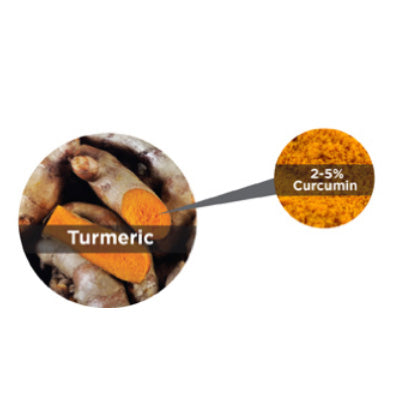
Turmeric VS Curcumin – What’s the Difference?
Share
Turmeric and curcumin are often referred to interchangeably and are an area of common confusion. Turmeric (also referred to as Indian saffron) is an ancient spice that comes from the turmeric plant, which grows in Indonesia and India. It is a common ingredient in South Asian cuisine, especially in curry dishes. New research has shown that turmeric contains powerful antioxidant and anti-inflammatory effects. Curcuminoids, compounds extracted from the turmeric root, are important nutrients. The three main curcuminoids are curcumin, demethoxycurcumin and bisdemethoxycurcumin. Curcumin is the most important curcuminoid as it contains the greatest amount of medicinal properties. Curcumin is therefore a very special component of the entire turmeric root (which may be why it is often used interchangeably) but they are not one in the same. In fact, curcumin only comprises about 3% of the entire turmeric root! Moreover, new research shows that there is actually a lot more to turmeric than just curcumin. Keep reading to learn more!
Is it better to take turmeric or curcumin ?
You have now learned that curcumin is the most important compound in the turmeric root. You have also read that it only comprises about 3% of the entire root. Now that we have hopefully cleared up the confusion between “curcumin” and “turmeric”, allow us to explain a little more about the turmeric root- including its 250 phytochemicals, which, until now, have not received much attention.
Phytochemicals provide defense, like the white blood cells of your immune system. They help maintain good health, and they all provide their own medicinal properties; everything from hormonal balancing to fighting off colds. New research has shown that over 250 of these powerful phytochemicals are also contained in the turmeric root! Therefore, if you are only taking curcumin, you are actually missing out on these other great health benefits.
What are the side effects of taking turmeric and curcumin supplements?
- In rare circumstances, very mild and non-severe side effects have been reported. Individuals have experienced upset stomachs, nausea, dizziness, diarrhea and a mild rash
- We recommend starting with a lower dose and gradually increasing the dose if your body responds positively to the turmeric supplement.
Consult with your doctor before using if:
- you are pregnant or breastfeeding
- you take blood thinners or anti-platelet medication
- you have a bile duct obstruction
- you have gallstones
- you have increased stomach acid or ulcers.
* It is advised to stop consumption of turmeric if you experience uncomfortable or serious side effects.
What medications should not be taken with turmeric?
Avoid turmeric and curcumin if you take blood thinners such as warfarin (Coumadin).
The benefits of Dr. D’s Ultra BioTurmeric supplement
Let’s take a step back for a second. Turmeric is notorious for being poorly absorbed by the body. As such, there have been several attempts at increasing the absorption and bioavailability of turmeric mainly through the use of additives or adjuncts, such as black pepper, in supplements. Unfortunately, they have come with various limitations.
After extensive research in conjunction with our partners in India, we have developed a way to unlock turmeric’s full medicinal potential by overcoming the obstacle of poor absorption. The key is in our technology, whereby the curcuminoids (including curcumin) PLUS over 250 phytochemicals are extracted, preserved and re-packaged inside of a natural turmeric matrix…thereby eliminating the need to use additives and adjuncts, such as black pepper (piperine)!
Our research has substantiated that the association of curcuminoids within its own natural turmeric matrix may be an excellent strategy to overcome the limitations seen in other technologies as the healthy nutrients are well protected inside a stable, easily digestible molecule.
Visit https://doctords.ca/products/dr-ds-ultra-bioturmeric for more information.